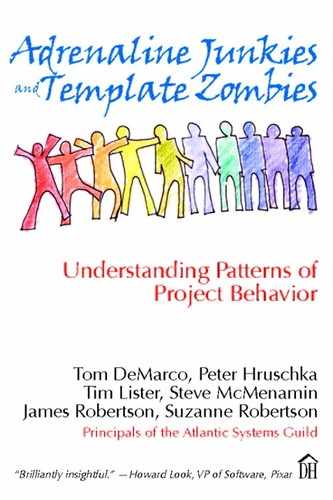40. Everyone Wears Clothes for a Reason
,
Copyright © Tim Davis/CORBIS
A policy of total openness makes progress grind to a stop.
Organizations that consider themselves “open” are usually pretty pleased to be so. They brag,“We’re an open shop here,” and expect others to be properly impressed. But there is a downside to too much openness, nicely expressed by intelligence studies pioneer Herb Simon: “An abundance of information creates a paucity of attention.”1 When the ratio of information to attention gets high enough, we’re in overload. More information doesn’t help.
1 H.A. Simon, “Designing Organizations for an Information-Rich World,” in The Economics of Communication and Information, D.M. Lamberton, ed., (Cheltenham, U.K.: Edward Elgar, 1997), pp. 187–203.
At one smallish IT organization I consult for, all staff members are routinely invited to all meetings. What’s worse is that they all often attend. You might wonder why. One of the managers explained the rationale: “What you have to understand about this organization, Tom, is that everybody feels they need to know everything in order to do anything.”
—TDM
If everyone needs to know everything to get anything done in your organization, you’re toast.
The opposite of a totally open organization would be one in which you had access to information only on a need-to-know basis. This would be typical of a high-security environment, such as defense planning or weapons development. Such organizations are a bit inconvenienced by the rigorous closing down of access, but they can nonetheless function. They are probably more functional than the totally open organization.
Obviously, the middle ground between these two extremes is where you want to be. It’s nice to feel that you’d be welcome to learn some of the particulars of a project going on nearby. This bit of openness suggests that your personal growth is acknowledged by the organization as something it should want to facilitate. But openness is a quality that needs not to be maximized.
It’s not enough to note that too much information can be a bad thing. The larger issue is to understand why we burden ourselves with too much in the first place. One reason is that information offered by others may come with Faustian strings attached: If you receive some information and don’t complain about it, you in effect agree to whatever it says. (See Pattern 25,“Silence Gives Consent.”)
A more common reason we burden ourselves with information is information anxiety—the fear of not knowing what others know. If you give in to this, you’re like the kid at his first wedding buffet—you load up on everything that looks good, for fear of missing any taste experience. Learning how much will fit on your information plate is more than just good strategy, it’s part of growing up.
